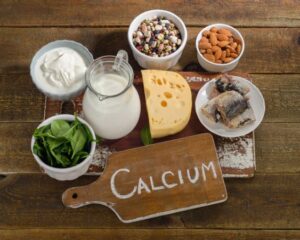
The pursuit of a balanced diet is a cornerstone of good health, and calcium is a mineral that’s often under the spotlight for its role in our well-being. Traditionally, the go-to sources of calcium have been dairy products, but changes in dietary preferences and increased awareness of health and ethical considerations have steered many individuals toward non-dairy options. For vegans and the health-conscious, ensuring a sufficient calcium intake minus dairy can feel like uncharted territory.
This extensive and engaging guide is designed to be a beacon for those navigating the landscape of non-dairy calcium. We will explore rich sources of calcium that stand out for their nutritional profile, and provide insight into how to incorporate them into your diet for optimum health. Our journey will take us through the aisles and rich pastures of plant-based and other non-dairy alternatives brimming with this essential mineral.
The All-Important Calcium and Why it Matters
Calcium is critical for a myriad of bodily functions, from the formation and maintenance of strong bones and teeth, to playing a role in muscle function, nerve signaling, and blood clotting. A deficiency in calcium can lead to osteoporosis, a condition that weakens bones, and may increase the risk of fractures.
The recommended daily intake of calcium varies by age, sex, and life stage, with adults between 19-50 years needing around 1000 mg per day. For those over 50, the recommended intake increases to 1200 mg per day. Meeting these requirements can be a challenge when dairy is not part of your diet, but as we’ll discover, it’s entirely within reach.
Shifting to Non-Dairy Sources of Calcium
It’s an exciting time for non-dairy alternatives. Whether driven by lactose intolerance, ethical considerations, environmental motivations, or simply a desire to explore new flavors and textures, more people are turning to non-dairy foods for their nutritional support. This shift has seen a surge in innovative products and a rediscovery of plant-based superstars that have been overshadowed for too long in the realm of calcium provision.
Spinach: The Leafy Green Powerhouse
Spinach isn’t just Popeye’s go-to strength source; it’s also a calcium contender. Per 100g, fresh spinach packs around 99mg of calcium – about 10% of the recommended daily intake. Moreover, spinach is bursting with other essential nutrients like vitamin K, which is vital for bone health, and iron, necessary for transporting oxygen in our bodies.
Almonds: A Crunchy Calcium Cache
Almonds are nutrient-dense nuts that offer around 250mg of calcium per 100g. They’re also a source of healthy fats, protein, and fiber, making them a snack that’s not just good for your bones but also your heart and overall health. Incorporating almonds into your diet – whether as a snack, in smoothies, or atop a salad – can be a tasty way to get your calcium fix.
Chia Seeds: The Tiny Titans of Nutrition
These small seeds pack a punch, providing approximately 631mg of calcium per 100g. Chia seeds are versatile and can be added to just about anything – from breakfast oatmeal to baked goods – to give your calcium levels a significant boost. What they lack in size, they make up for in nutritive value, with chia seeds also being high in omega-3 fatty acids and fiber.
Tofu: Soy’s Silent Superstar
Tofu, derived from soybean milk, provides a substantial 350mg of calcium per 100g. This non-dairy staple is also a complete protein, meaning it contains all nine essential amino acids required by the body. Tofu’s adaptability to flavors and cooking methods makes it a versatile ingredient that can smoothly integrate into various cuisines.
Broccoli: Not Just for Sprouts and Stalks
Broccoli is a familiar feature of a healthy diet for many reasons, and calcium content is one of them. With approximately 47mg of calcium per 100g, it’s a modest but meaningful contributor to your daily calcium intake. Broccoli is also rich in vitamin C, which aids in calcium absorption, making this vegetable a double health whammy.
The Benefits of Choosing Non-Dairy Calcium Sources
The advantages of turning to non-dairy alternatives go beyond catering to dietary restrictions. These foods often bring a host of benefits, including lower levels of saturated fat, no cholesterol, and a diverse range of nutrients that support overall health. Diversifying your sources of calcium also means exposing your body to a broader spectrum of health-promoting compounds, potentially leading to a more robust and resilient state of wellness.
Nutritional Value Beyond Calcium
The non-dairy foods outlined in our exploration of calcium-rich alternatives offer far more than just this single mineral. They are rich sources of various vitamins, antioxidants, and macronutrients, all of which contribute to a comprehensive approach to health. By incorporating a variety of non-dairy items, you’re not just meeting your calcium needs; you’re also fortifying your diet with a wealth of nutritional benefits.
Embracing Dietary Variety
Variety in diet is a principle that nutritionists and health experts universally endorse. Opting for non-dairy, calcium-rich options is a way to ensure this variety, as these foods often hail from different food groups and offer contrasting flavors and textures. By regularly rotating these items into your meals, you can stave off dietary monotony and embrace a wider range of tastes and dining experiences.


Follow Us